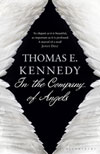This is the 2nd in a series of guest posts from Thomas E. Kennedy, each focusing on questions that have empowered him - and could also empower you - as a writer.

Q: Must you write?
Thomas E. Kennedy: This is a question that I learned to ask myself from the great Austrian poet R. M. Rilke from his marvellous Letters to a Young Poet (there is a photograph of Marilyn Monroe reading it by the way).
What Rilke said to the young poet he was mentoring was, ask yourself, 'Must I write?'
If your answer is no, you have gained important self-knowledge; if you are able to quit writing, perhaps you should seriously consider doing so.
But if your answer is yes, then that matter is settled and you don’t have to waste time agonising over it. You cannot quit - writing is too important to you.
What do you think, can you quit writing?
 Thomas E. Kennedy is the author of eight novels, as well as several collections of short stories and essays. He teaches creative writing at Fairleigh Dickinson University.
Thomas E. Kennedy is the author of eight novels, as well as several collections of short stories and essays. He teaches creative writing at Fairleigh Dickinson University.
In the Company of Angels, published by Bloomsbury in June 2010, is one of four novels comprising the Copenhagen Quartet. It is the first of Kennedy’s books to be published in the UK.
Read Thomas E. Kennedy's first guest post, When do you become a writer?
Click to visit the official website of Thomas E. Kennedy
If you know you must write then surely the next question; is what form your writing is best suited to? Some forms (novels, biographies memoirs, etc) require large chunks of discipline, while others (poetry, short prose) allow the occasional burst of creativity to be sufficient. So: when 'must I write' is answered yes then perhaps 'what must I write?' is the logical successor.
I agree, Shankut. For me and many of us here, I feel the following is more appropriate:
"I Must Write.'
Must I write?
In my teenage life I used to read adventure books and relieved the fantasy world in dreams. Some were the adventures that I had read and relived in the dreams, but quite few were from my unknown area of the brain which had its own factory that manufactured some remarkable adventures.
Next morning I used to reminisce these dreams, either by putting them on paper or think, talk to friends. So since tender age I developed the skill for putting dreams on papers and since then writing has become a second nature of communication and has not relinquish since. The question: 'Must I write?' Never crossed my mind.